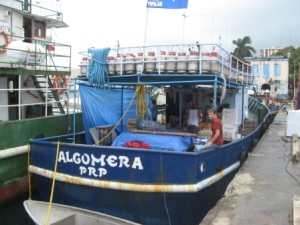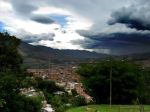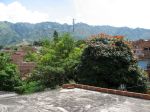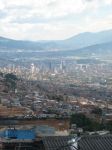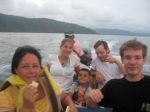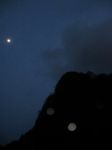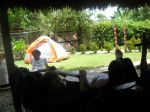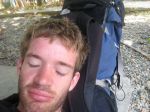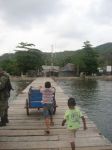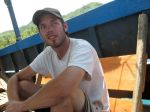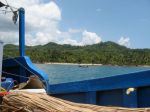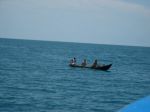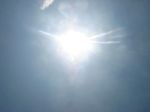One awesome day in Medellin, a friend of Margarita’s asked us if we wanted to go Paragliding with him and some friends. We accepted and followed him around downtown Bello (Margarita’s Barrio of Medellin) gathering allies for the trip. Soon we had gathered a friendly rambunctious crew. We caught a bus surging with people. The bus wound up to the upper neighborhoods of Bello, than broke free into the lush green countryside. The bus continued to climb the switch back road until finally it reached the top of a pass. The land opened up to a hilly plane with the road snaking up and down the subtle countryside. Around every bend there seemed to be a beautiful finca (farm house) and vast slopes of fertile land. We passed two pueblos, each one with it’s own unique character. We could hear all the joy of the Colombian country music blasting from the bars and houses. We passed quaint little churches, and bustling plazas. The bus began to follow a happy meandering river down a soft valley towards the direction of Medellin. Soon we came to a steep drop off with an incredible view of the Medellin Valley below and the Mountains on the other side. The bus dropped us off at an artistic wooden bar where we relaxed and took in the incredible view of Medellin. After absorbing the view we were lead by our friends up a long series of wooden steps, reaching toward the sky. We eventually came to a flat grassy plain, where people were flying kites, lounging around and paragliding. It was like some godly playground. Just a little higher there was a stoic bar that had the look of an ancient Latin temple–stoically seated on the apex of the green hill, protected by a small gnarly forest. People lounged about with seemingly no cares in the world. All the while there were Para gliders flying around like human birds. The views were spectacular and the sun played perfect notes of happiness across the island in the sky. Later we gave paragliding a whirl. Wow! It’s paradoxically the most peaceful activity I have ever done. Apart from the occasional swooshing of wind, it is remarkably silent, inducing a deep state of relaxation and ecstasy. You can just float, higher and higher, or make fast, swooping passes barely above the ground– or adrenaline gushing corkscrew free falls. I was also able to scour the land examining its beauty and exploring the nuances of the perfect paradise mountain. My favorite view was of the once peaceful river viciously cascading hundreds of feet down the treacherous slope, into the cradled valley below. As the sun began to delve behind the distant hills we bounded back down to the groovy bar by the road. We ordered coffee and sat on benches placed thoughtfully on the nub of a grassy drop-off. The colorful dusk soothed the eyes and quenched the soul. After our coffee, we took a long night walk back through finca land, to a little pueblo, where we were to catch a bus back to Bello. The temperature was cool and the stars were immaculate.
~Medellin~
•August 15, 2009 • Leave a CommentWhen we arrived to Margaritas house we were taken into a humble abode high on a hillside, which gave phenomenal views of the lights emanating from the city. Inside Margaritas house we became more acquainted with the family that warmly greeted us at the bus station. The house was an apartment with three bedrooms, a kitchen and a living room. There were a total of 9 people living there including Margarita and her son Santiago. Three of her daughters live there. The oldest, Yuliet, has two little boys. The middle child, Caren, occupies a room with her husband, and her little boy– she is expecting another in a month. The youngest girl is 18 and has no kids yet. They kindly made us stay there and made their living room futon into a comfortable bed with sheets and all. This became our home for a week as we got to know Medellin and it’s people. Each day we woke up to a large breakfast with hot chocolate. Soon after, they would make us a massive lunch; at night they made us dinner. They also insisted on making our bed. Several times we tried to leave in fear we were intruding but they insisted we stay longer. They had their hands full accommodating 9 people and yet they graciously and happily took on two more. By the end of our stay with them, they had more than paid us back for helping Margarita financially on our trip. The week stay with Margarita immersed Jeremy and I in the culture. By the end of the week, my Spanish felt almost as good as it felt in Ecuador. Colombian Spanish has a unique words and rhythms I have come to enjoy.
There is no place like Medellin on earth. It is a lush, green paradise city, surrounded on all sides by high rolling hills. The houses crawl up the slopes, into various happy neighborhoods. The weather is perfect, with temperatures ranging from 60 degrees farhenheit to 80 degrees . It is called the city of Eternal Spring. The people are unreal in their hospitality and friendliness. The streets teem with life as bright-eyed Colombians of all ages live out their lives. The city is well planned and has the cleanest subway I have ever encountered which stretches the length of the Valley Medellin occupies. There are several parks, museums and universities all with impressive architecture. The people in Medellin call themselves, Paisas. The paisas dress incredibly well, and colorfully, as Medellin is the fashion capitol of South America. Medellin is also known for having some of the best looking people in the world, a fact that is hard to dispute. Jeremy and I quickly let the joy of the city permeate our beings and soon we became Medellin believers. Medellin became the host for several, colorful experiences.
Once one breaches the high, mountain slopes cradling the city, one arrives on a mountain plain with rolling green hills. I call the area Finca Land (a finca is a farm house). The Colombian Pueblos outside the city have rich rural cultural customs and the most beautiful land my eyes have been blessed to see. Medellin has a violent history, revolving around drug cartels and drug lords. In recent years, it has become known as a safe place. The fighting related to cocaine tends to take place far outside the city limits in Jungle areas. The fighting is a vague power struggle between the FARC, the Government and the Drug Lords. It is hard to understand the fighting, because the ideals of each group involved are vague and they each claim they are in the right. It is easy to assume that the “good” government is fighting the bad FARC but it is my philosophy that in war there are two sides to every tale. Since being here I read a horrific article, which gave me pause at Colombia’s military’s legitimacy. It seems they got caught (thank god) rounding up poor people from downtown Medellin, putting them in FARQ uniforms and mercilessly executing them in FARQ territory–in order to give the illusion that the military campaign was progressing and thus convincing the congress to give the military more funding. Violence is a not uncommon in Colombia. Medellin was home to Pablo Escobar, who was born in an epoch, called la violencia (the violence). It was a time period with little order and a lot of violence as various groups challenged the oppressive elite. This time period shaped Pablo Escobar, who became known as one of the most deadly and wealthy drug lords in the world. He is famous for a philosophy of power used against anyone ballsy enough to oppose him: silver or lead. Meaning he would either pay a person off or kill that person. People around the city speak of him in high regards and describe him as legendary. He was known for empathizing with the poor of his country, while ruthlessly aggravating the ruling class. He is famous for going to parks mid-day and handing out money to whoever walked by. He is also known for putting a bounty on the heads of all police officers–an overt challenge to the establishment, and a ruthless one at that. He was once imprisoned under the condition that he could construct his own prison. He constructed what was basically an opulent mansion, with all the accommodations and necessary infrastructure to maintain his empire. He would even go out for evenings on the town, attending plays etc. The Colombian ruling class couldn’t handle him so they got re-enforcements from the United States Military. Pablo had to go into hiding for three years until finally he was found and killed–with the assistance of U.S. military technologies and intelligence. The happiness and security emanating from Medellin makes it hard to imagine such a tumulus and vicious past. But it lives on etched in the gratitude of the people, as they seem to give praise to the relative peace that now envelops their city.
Colombia!
•August 15, 2009 • Leave a CommentFinally we were ready to go. We negotiated a boat heading to, Capurgana, a port town smack on the border with Colombia. We got our passports stamped, except margarita, and we headed for Colombia. The boat ride was thrilling. Right at sunset, the sun became a bright orange, accentuating the blue of the water and green of the land; the boat motored by a large pointed rock — the official border between Panama and Colombia. We were in Colombia! Twenty minutes later we arrived in a cool little port town. The streets were buzzing with life. A man approached us, wondering if we would stay in his hotel. His price was cheap so we headed to a comfortable hotel where we quickly crashed, exhausted. The next day we investigated boat prices to our next town–we were still far away from any roads. It seemed the next leg out our trip was going to be a challenge as well. There were no boats heading south that day and after a fruitless day asking boat people for rides, we had to surrender another night to the port town. Later that night we found a man who was selling tickets for a boat that was headed to Turbo in the morning. Turbo had access to roads that could take us anywhere we wanted to go in Colombia. We couldn’t wait to get away from the boat world because it involved a lot of negotiating, waiting and money. Finally the next day rolled around, we got our passports stamped by a lady with a swine flew proof mask on her face. She was unimpressed that we had been to Mexico. We assured her we didn’t have H1n1. Finally, she stamped our passports. The next day rolled around and there was a large crowd waiting on the dock with us. We got on a crowded speedboat and breezed 3 hours to Turbo. Turbo was a bustling city with a strong Caribbean influence. We bought bus tickets to Medellin with Margarita and her son Santiago. Swen and Catherine continued on their bikes to Cartagena. We said our goodbyes and off we went on a twelve-hour bus ride to Medellin. The scenery was incredible. We passed high canyons, narrow gorges, lush green fields, and mountain pueblos. Finally, we saw the light flooded metropolis of Medellin. The bus drove down the valley to the bus station where Margaritas whole family warmly greeted us. Margarita warmly invited us to stay at her house with her family, until we figured out our plans.
Blithering Bag
•August 15, 2009 • Leave a CommentAfter a divine four hours in the speeding dugout canoe, we arrived in Puerto Valdia. We left our plenitude of things on the beach, and thanked the man for taking us. Bit by bit we carried our stuff to a patch of grass on the outskirts of the small town. The place was crawling with military personal; one stood on the beach near our stuff, radioing to his commanders something about our arrival. On my first trip to the grassy area a military man stopped me. They seemed to know who I was, they told me they had found my bag and wondered where my brother was. It crossed my mind that it may be a trick and they were savvy to my brothers plan to circumvent the system. I wasn’t sure what to do. He began to question me about my brother. I told him I would talk with him when I finished carrying all my stuff from the beach to the grass. Meanwhile my mind was racing about how to handle the fragile situation. Luckily on my last trip to the beach, I saw Margarita and Jeremy pulling into the shallow harbor in another boat. Obviously something went awry with their plan, but I was glad because there was a strong possibility the military did somehow find the red bag with the passport. We carried the rest of our stuff to the grassy patch, which was right next the police station. There, a dog anxiously frisked our stuff making sure we weren’t packing any drugs or weapons. After frisking most the bags the dog viciously attacked one bag. I looked around wondering who was going to burst into tears. Apparently it was the polices control bag which was used to make sure the dog was alert. Soon we were eagerly questioning some of the officers about the whereabouts of our red bag; they seemed to shift around with vague answers, and hollow promises. All of the members of our party thought they were acting quite strange. Eventually they told us they would send it in a police boat at 9 the next morning. We were relieved to get a concrete answer and we began to search out places to stay the night. Swen, Catherine, Margarita, Santiago Jeremy and I all found a place to camp; it was more or less the backyard of a house. We paid the owner a small fee and enjoyed finally relaxing on nice cozy grass. We were all relieved to be off the islands. Life on the boat was exhausting because there was never a place to rest. It was always: wet metal, Blistering sun, people, music, and late night celebrations. In addition we always felt powerlessly at the whim of the boats meandering purpose. Here we began to feel more free and relaxed. We were all very excited about the prospect of moving on in our travels. That night we cooked dinner together and enjoyed some cold beers and cheerful conversation. At 9:00AM sharp the next morning we were at the police station asking about our bag. They played the same vague song and dance as the night before. They said that it was on the island but the phones were down and their radio wasn’t working. We were frustrated and unsure if they were messing with us out of boredom. We decided to take matters into our own hands. We searched the beach for people with boats and asked them if they were heading to the island were our bag supposedly was. One man was about to make the trip, so we negotiated to pay all of his gas if he came back with our bag. During our whole operation the police sent a guy to keep tabs on us–radioing back to dispatch every once in awhile. After a long day of wondering what would transpire, the military came through with the bag. All the contents of the bag were there, including Jeremy’s passport. We had an immense sense of relief and I was excited to finally have a change of cloths. The mystery of who took the bag and why remains an anomaly…..
Castaway
•August 15, 2009 • Leave a CommentThe island we were on was the most beautiful island I had seen yet. The huts were further apart than on the other islands; also there was a little hill on the far side of the island with a palm tree forest covering the summit. The dock we were standing on was in the midst of construction, it had 2 by 4’s laid across but none of them were hammered down. There were a few gaps were no planks were, leaving various wholes where we could see the turquoise water below. If the dock were in The States, it would be a lawsuit waiting to happen. Looking through the gaps on the dock I saw thousands of little fish that seemed to move as one organism; they had uncanny intuitive connections that allowed tens of thousands of them to swarm together switching directions instantly and yet staying together as a perfect unit. While I was tripping out on the fish, Swen and Catherine set out to find us a boat. Soon, Swen and Catherine were steaming, as there were no results. I joined the hunt in a calm saunter; somehow I knew things would work out. Swen and Catherine were working themselves into a angered frenzy. The more they pushed the less the islanders yielded. They eventually concluded that everyone on the island was retarded. I began to detach myself from the goal at hand knowing the island people moved to the beat of a different drummer and that there was order in their seemingly vague indifference. People began to speak of boats that would be coming the following day and soon the prospect of more days of hazing in the hot sun waiting, seemed likely. In the midst our searching, a gang of motor canoes came to the islands cheering and waving huge banners. Soon the whole population of the island was on the shifty dock, jumping up and down and cheering as though they just won a war. All ages participated in the thrilling spectacle. Laughter and happiness filled the air. It seemed their candidate won the election. Soon the winning candidate’s boat came to the island and he was greeted as a hero; everyone cheered his name, in loud celebratory pulses, as they paraded through the small island village, in a tidal wave of joy. I realized I was witnessing a unique event. I felt very much like an outsider observing them, but I enjoyed the spectacle. After the cheers winded down, a kind fellow told us he would take us to Puerto Valdia, for a good price. We gladly accepted and lugged all our stuff–bikes and all–into the motor dug out canoe, with the man, his wife, and his daughter. I sat in the front of the canoe and enjoyed the spectacular, lush, coastline views for the four-hour boat trip. I nervously wondered how things were going on Jeremy’s end.
San Blas Un-plugged
•August 15, 2009 • Leave a CommentUpon waking, after a restless night sleep, I noticed that the red bag we had been sleeping next to was missing; it contained my entire wardrobe, one of my books, and a pair of Jeremy’s Jeans with his passport in them. Yes, it is a traveler worst nightmare. We were frantic looking for the red bag, but it was nowhere to be seen. We were frustrated beyond all possibility. I limped around the island hoping to catch a glimpse of the bag. I lost trust in anybody I saw, particularly those lurking around the boat. It began to sour our experience. We reluctantly went to a Police/military station on the Island. The police swaggered around half listening to our story, until we mentioned the passport. Suddenly they got deeply serious and investigated this thing like it was a murder. Two hours later they rounded up our crew, the guard (who was supposed to watch the boat last night) Jeremy and I all in a little room. They accused our crew of negligence, and told them they couldn’t leave until the passport was found. Once they authoritatively bestowed the blame, they seemed to relax and their investigation began to wane. I felt guilty; I didn’t think our crew deserved any of the blame. If it was anybodies responsibility it was the thieves and ours. After the crescendo of blame things began to subside. The bag was as good as gone. The police later told us there was no way we could continue toward Colombia without the passport; we would have to go back to Panama City and order an expedited passport, if we wanted to continue on. Good thing we got the authority involved, we sarcastically noted. We were put in a very bad situation, we didn’t want to go back to Panama City and wait for Jeremy to get another passport. It would have taken weeks and cost us a great deal of our precious trip money. The passport wasn’t the only problem: I had no cloths to change into and all my toiletries were gone. We slowly began to surrender hope in seeing the bag again. We set our intention to Colombia once more and waited for the universe to respond-We weren’t about to go back to panama over a missing piece of paper. Serendipitously we met a Colombian lady, named Margarita, who was sitting on a bench facing our boat. Apparently she was headed to Medellin Colombia, with her son, Santiago. She had been working in Panama City but she missed Colombia and decided to go home. She was extremely low budgeted and had been stranded for a couple days trying to get a boat. She had overstayed her Visa in Panama and was unable to pay her fine, so she was trying to skirt around the boarder without presenting her passport. She already knew of a boat that was supposedly going to a different town than our boat, where one could cross the boarder without the passports being checked. This bit of information was interesting to us, as we had just recently been put in an awkward situation. We told her about our problem and ideally we wanted to get to Colombia before reporting the passport missing. This would allow us to be in Colombia while waiting for the new one to arrive, instead of being in Panama. It wasn’t a good option but it seemed our only way, short of going back to Panama City. We decided it would be wise for me to get my passport stamped properly, and we would leave the shenanigans up to Jeremy. Her boat was scheduled to leave early the next morning. That morning Jeremy and I divided the money and made plans to meet in the first Colombian City, and contact each other by e-mail. Jeremy than left and got on the other boat, with Margarita and her son Santiago. My boat–the Algomera–embarked for the next island with Swen, Catherine and the crew. After a mellow two-hour ride we arrived at the island there Once there the captain told us this was as far as they were going, and that I could find a boat heading to Puerto Valdia easily. I objected and reminded him the deal we originally struck had us arriving in Puerto Valdia. He basically told me too bad, things changed. This ticked me off a bit as I was about to be stuck on another island for an unknown amount time, and having to pay another boat fair. Despite some resentment about my deal with the captain not being honored, I said my goodbyes and wished the crew and the captain well. Soon the AlgoMera, my home for the past number of days, disappeared in the distance.
Island Bobbing
•August 15, 2009 • Leave a CommentAt high noon we were approaching another hut swamped, island. We pulled up alongside a wooden coconut boat, were we saw a white couple looking very interestedly at our boat. They negotiated quickly with our captain, and jumped on with their bikes. It was a quick stop and soon we were off with new members. Instantly our boat began to completely change direction, and I could see that the male Gringo–whose name we later found out was, Swen– was frantically negotiating something with the captain. It seemed he had left his IPOD and some cloths on the boat. I quietly felt glad it wasn’t me. Later that day we got to know Swen and his Girlfriend Catharine. They had signed themselves up for the 5-month bike trip through Central and South America– biking most of the way and bussing the rest. Swen was German, and Catherine was from New Mexico. It is always nice to meet people from home. The boat was now packed full and all the shady spots were taken, I was once again reduced to a place on the upper deck, covering myself from the powerful sun with a shirt over my head. The day lingered lethargically, as we bobbed from one habited island to the next, gathering more people. I was eager for the sun to go down and for everyone to get to their island and off the boat. My feelings towards the islanders were skewed by their feelings towards me. They seemed cold and apprehensive–sometimes curt and rude. But other times I met islanders who were friendly and genuinely interested in how I ended up in their world. One such experience occurred while I was sitting on the upper deck as the suns wrath began showing signs of surrender a kid, about 17, sat next to me and started a conversation. I had a difficult time understanding him; his Spanish had an accent I had never heard. He was kind, and asked me lots of questions about where I came from. I learned that he had gone to Panama City to work because he couldn’t make a good living on the islands. He said he liked Panama City but was excited to go home. Apparently he was coming home to vote. It seems they were in the midst of an important election process. Many people were coming back home to the islands, to place their votes. I had wondered what was going on because I saw lots of flags and shirts that seemed to advertise candidates. He was palpably excited–with a shirt proudly displaying his candidate and a flag he occasionally waved around. But I perceived his excitement to be more in anticipation of seeing his family, whom he hadn’t seen in two years. He asked me if there were police and firemen where I lived. I said yes, and that they looked, walked and acted exactly the same in Panama as in the USA. I was surprised by his question. I thought the answer was obvious. He pointed out the various islands to me telling me their names. It was quite interesting trying to imagine what it would be like to live on one of these islands most of my life. He explained differences in cultures among the islands, and why his was the best. I asked him what he thought of Gringos? He hesitated for a second than told me: well, we think you must all be rich. He than pointed to a white Catamaran boat anchored off an uninhabited island. It was a beautiful expensive looking boat; it looked like a futuristic hovercraft in the midst of all the other boats. He told me, 9 times out of ten they are Gringos. I saw his point, but I also explained to him, we are a privileged country, but we have our share of poor people too, who can’t afford to travel, let alone own a boat. Soon an inhabited island came into view. When we arrived to the island a large cheering crowd received the boat. Family members were meeting up and joyously sharing the apparent thrill of elections. I reflectively thought back to the hype of our elections and how it somehow felt more like the end of a Disney Movie than reality. I later found out the islanders were most excited about their local politics, than their national politics. It seemed more pure that way. As I watched everybody rushing off the boat, I saw an older lady carrying my red bag. Just as I was about to climb off the upper deck, jump off the boat, and tackle her(joke)–I saw Jeremy stop her. We got the red bag back and put all our stuff together. The boat was scheduled to stay at the port during the night and leave sometime mid-morning. We enjoyed the emptiness of the boat. We did some exploring on the island, but huts and more huts was all we found. We began to feel intrusive the more we strayed from our base, so we moseyed back to the boat and had good conversations with Swen and Catherine. We also got to know our crew better. The crew was nice to us but very quiet; they felt very much at home on the islands while we felt like outsiders. Asking the captain questions sometimes-yielded information but more than anything it seemed they were going with their own flow, not a set schedule. Soon the socializing subsided and we found sleeping spots on the damp deck. I carefully lay down for night two of my painful sunburn.
Paraiso
•August 15, 2009 • Leave a CommentMid-morning the islands sluggishly drifted into view. They were spectacular. They reminded me of those perfect island paradise pictures people often have as their computer backgrounds–with lush tropical palm trees lining the white beaches and multi-colored pools of blues and turquoises, with small waves lapping white froth on the soft sand. The first island we docked at was about the size of an acre. There were a hand full of palm trees speckled across the sand and two funky huts. The water was a pure dark blue and I saw thousands of fish wallowing in the inviting lagoons. The boat pulled alongside a dock where there was a quick exchange of paperwork before proceeding further into the island kingdom. After a couple of hours of drifting through seemingly un-inhabited islands, we approached an island bursting with huts, docks and canoes. The huts were made from dead palm leaves and sticks. Scattered across the various docks there were at least 50 old canoes, dug out from trees. There were several shacks on the docks; we deduced they were the bathrooms, plopped courageously over the sea. Our injured boat slowly pulled in to the main, concrete dock. People gathered around inspecting the new arrivals. Some of the women were wearing traditional clothing, which consisted of bright gowns, and odd piercing. The children ran around in their bare feet and the men wore shorts and t-shirts. Everybody was excited about the arrival of the boat, and there was an exchange of loud shouts between the crew and the islanders in their native tongue. Soon we were docked and the crew mingled with the Islanders. I felt like Gulliver, suddenly landing in a strange new world. It was a lively scene with canoes going to and fro and loud animated people enveloping the dock and all the docked boats. Everybody wanted to know about the crippled state of the valiant, AlgoMera. After a bit Jeremy and I decided it was time to reconnoiter the island. Upon mentioning our intention to the captain, we were told the boat would be stationed on the island as they attempted to fix the upper deck; we weren’t scheduled to leave until the next morning. With time on our side we set out to investigate the island. The pathways between the huts were extremely narrow and often muddy from rain. We felt like we stepped back in time–people were living simply. We saw very young girls pregnant and with children. We spoke with some of the natives but often they seemed reserved and uninterested. After less than an hour we had cased the whole island, weaving between all the huts. The island never opened up into unused space. I wondered if they had population issues. When we returned to the dock there was a boat resuscitation was well under way. We watched them Jimmy Rig our boat closer to new. We uncomfortably hung around, not ever finding space to relax, away from sun. Jeremy and I played a game of I spy in the copious trash piles that clung to the island shores. They literally didn’t seem to deal with their trash; they just threw it out into the ocean. The inhabited shores always had a ripe smell of rotting organic matter. I wondered if this seemingly sanitary blunder actually improved their luck fishing due to the magnitude of fish I saw floating just off the shore. The day drew out in a warm uncomfortable haze. I brilliantly decided to take a nap on the roof of the cabin to catch up on sleep. I applied sunscreen but during my nap my swimsuit had hiked up above the backs of my knees, giving the sun a meaty target for it’s solar fury. When I woke up the crew was almost done fixing the boat and I was impressed with their progress. At the end of the day they had the upper deck erected and welded back into place with stronger metal supports and two sturdy wooden planks. She was actually looking sturdier than before. In the evening we strolled the island and managed to play a game of basketball with some of the island kids in a court nestled against a small schoolhouse. As the evening air began to cool the island, I could feel a familiar, warm pain sizzling the backs of my knees. I was on the verge of the most debilitating sunburn of my life. It was a small strip of horrifying red and purple, right on the crease of the backs of my knees. I began to limp walk around–the incessant pain never seizing. We managed to meet an Argentine traveler and a group of islanders whom invited us towards their family’s hut. We sat outside as they brought us beer and began to curiously inquire about our life. I took a second to take in the reality of where I was: we were seated in a walkway with huts on either side on the edge of the moonlit water; in the foreground there were dug out canoes patiently seated on the shore; in the distance we could make out the dark silhouette of a another palm tree inhabited island. The moonlight seemed to play on the hut roofs, like a stage light on a prop. It felt surreal. One of the kids began to talk about their culture and the importance of it to him. We were told the older generation wished the younger ones would take more of an interest in their traditional culture. As if to prove the statement true, the conversation soon drifted from their traditional culture to American culture. I was amazed how much American music they knew; and they were equally amazed how little we knew. It’s funny, they always expect that because we are from the United States we should know everything that they know about it, but in the music department it is hard because there is so much music from the States. Additionally I lean towards the challenged end in the pop-culture music department. The night’s festivities slowly simmered to oblivion, and we dispersed back to our respective places, them back to the huts, and us back to our boat. We found an uncomfortable place, on the damp deck amongst all the stuff. I achely slipped into the sleeping bag for the first painful night of my horrible sunburn. The trip through San Blas was a paradoxical stint through paradise: on one hand we found ourselves amongst all the beauty of a tropical utopia and in a national geographic geek’s dream. On the other hand, I have rarely felt so uncomfortable (not only because of my sunburn) and powerless for such a prolonged stretch of time.
All night long people were mulling around the boat talking for reasons I was unsure of. Then, suddenly at four in the morning, hordes of people flooded the boat; people began crowding next to me, and tripping over my legs. As suddenly as they got on, they got off again. I couldn’t figure out what the heck was going on. Then, fifteen minutes later, they all stormed on the boat again, this time for good. I sat up Indian style to make room for all the families. They were mostly talking their native language and were caught up in a whirl of enthusiasm. Within a few minutes the boat was leaving; where we were going and when we were to arrive I had no idea. I was a little grumpy, as I hadn’t slept much in two nights. All our tail chasing in Panama was exhausting, and this was no relaxing excursion. The boat dutifully, rumbled to its next island, arriving late morning, as the sun began to blister down. I limped off in hopes of finding some food. I managed to find some coffee and chips to hold me over. When I got back to the boat there were more people on than before and I was demoted to sitting on the upper deck–the sun my only companion. I found somebody’s old shirt lying around; I placed it over my head and face with the intent of hiding my nordic, white skin from the tropical sun. I was beginning to get hungry and wonder about our captains promise to feed us a long the way. After a couple of quick stops at more islands, we arrived at one were we were given a meager lunch. We docked next to an old wooden coconut boat. In a frenzy, we rushed through the decrepit boat and onto a concrete pier. There were several indigenous ladies passing out lunch, which consisted of rice, beans, and spam. Quickly we were herded back on the boat. Once again I found myself on the newly erected upper deck, looking out over paradise in a peaceful haze. My sunburn continued to torture me throughout the day, especially when I stood up, sat down, or walked. I limped around and executed any action excruciatingly slow.
Indifferent Sea
•July 22, 2009 • 2 Comments Our boat, mysteriously named, AlgoMera was relatively small compared to the others in the port, but spacious enough for a crew of eight and plenty of supplies. There was a tiny captains’ den where the captain slept. The other crewmembers were stowed in bunks stacked on top of each other, like a human dresser drawer, lining the hallway between the cockpit and the kitchen. The deck was protected from the elements by an upper deck, which extended out from the cabin toward the stern. The upper deck would have made a great place to hang out, unfortunately however, it was chock-full of propane tanks. On the lower deck there were various types of furniture and supplies–everything that couldn’t fit in the hull below the deck. On the bow of the boat there were a number of five-gallon drums brimming with gasoline. The boat was carrying everything imaginable that the islanders may have needed. The amount of supplies packed into the small craft seemed to defy possibility. When the last of the items was fastened, our stoic captain, quietly boarded the boat. In no time the low rumbling of the diesel engine began to vibrate the vessel. My excitement stirred. I looked back towards Colon and felt a sense of triumph to be moving on. I wondered if I would ever see Colon again. Suddenly, the guard to the port–a man who helped us jump through administrative hoops–came and gave us a heart-felt goodbye. It was surprising because I always got the feeling we were annoying to him, but there he was giving us a warm goodbye–pounding our hearts in the midst of a handshake and wishing us luck. Shortly after our un-expected goodbye, the last minute bustling on the boat began to subside; the crew untied the line, jumped on the boat and the captain maneuvered the boat toward the dark unknown. We were scheduled to arrive at the first island at six the next morning. My mood struck a grateful, nostalgic chord as I reflected on the awesome experiences that brought me there. It was certainly a turning point in our trip. The car section was done and soon we would be grappling with traveling through mysterious islands and a new continent. I was enthralled with Colombia. It had been my concept of paradise for the last year or more— and soon I was to experience it! The lights of Colon became fainter as we rode out to sea, soon we passed a lighthouse propped on the edge of a long jetty and bigger waves began to toss our little boat. It was my first experience at sea and out of sight of land–it was thrilling. There is something sinister about the ocean at night. Life felt like a blood droplet resting on the blade of a knife. Jeremy is a veteran at sea compared to me and I began to ask him: “If one of us fell in, what are the chances we would get saved?” His response was “a 50% chance. At night, in the waves, it is incredibly hard to find a person.” I had a dark obsession with that idea and I couldn’t stop pondering the nightmare. He went on to tell me, “Most of the bodies found in the ocean are guys who have their pants undone, because they get jarred off during the act of peeing off the deck.” This was easy to imagine, especially with the vicious way the waves were pimping our boat around. Soon everyone became accustomed to the boats pitching motion; the crew hunkered down in the cabin. Jeremy and I looked for a free space on the deck, which we found at the stern of the boat. We were just out of reach of the upper deck’s protection, sleeping under the brilliant stars. We rested our sleeping bags on the damp planks and waited for sleep. A couple hours later I was awoken by particularly large waves. I noticed Jeremy awake, gauging the upper deck. The upper deck, heavy with propane tanks, swayed rigidly with each passing wave. We began to notice stress marks on the narrow pipes that supported it. Right before our eyes we were watching the stress of the upper deck, torque a fracture through the pipes. It began to sway, with increasing fury and freedom; it looked like it would soon find itself in the water, if nothing were done. Quickly we understood the precariousness of our location on the stern, as the upper deck was on the verge of collapse and a propane avalanche would have guided us to the next world. The crew began yelling at us from the cabin, encouraging us to run under the failing upper deck, to the bow of the boat, and out of harms way. The metal made loud screeching noises and a jarring bang every time the roof swayed from one side to the other. The captain slowed the boat down to just short of an idle. There we sat; a toy boat in the middle of the dark, indifferent and powerful ocean. We putted forward, the upper deck closer and closer to giving way. With less noise from the engine, shrieks of the tortured metal sang into the foreground. During a calm stretch we made a run for it under the upper deck, to the cabin area. The crew was frantically yelling in their native tongue trying to figure out what to do. Jeremy wanted to find some line to crosstie them under the upper deck to create better support, but the captain said there wasn’t any spare line. Nobody seemed to know just what to do. Every one was nervously watching the violent sway of the upper deck and the menacing propane tanks. A few members of the crew began to take action: two got up on the roof of the cabin—which was sturdily built and structurally not part of the upper deck. Whenever there was a lull in the waves, one of them ran out on the failing roof and grabbed a propane tank, brought it back to the other, who than passed it down to Jeremy or I. The object was to get the propane tanks out of harms way without blowing up the boat. It was like somebody’s sick idea of a relay race. Each time they passed a tank down, they handed it to us as though it were a bomb, and made sure we executed extreme caution, lest one fall wrong and leak gas. That’s when my fright turned into terror. I felt like we were on a floating bomb, with all the propane tanks and gas drums enclosing us. The upper deck began to rip itself away from the cabin. Only twisted, strained metal was keeping the propane tanks from crashing down. The unpredictable heaving of the boat made the operation feel extra dangerous. The propane tanks being passed to us seemed endless. The upper deck leaned heavily to one side. Regularly a wave would rock the boat, shooting the force of the upper deck to the other side; the upper deck would teeter on the other side before another wave would powerfully slam it back to its preferred side–tearing itself ever closer toward the ocean. In the midst of all this, the guy on the cabin roof would wait for a lull—difficult to perceive in the dark–before running out on the upper deck, monkeying loose a propane tank and gingerly lugging it to the safety of the cabin roof. If he had found himself on the upper deck at the wrong instance he could have easily been tossed into the ocean. This strenuous and unnerving process seemed to last hours, until finally the last of the estimated 80 propane tanks were down and secure. The roof became lighter and less unruly. The crew tied the upper deck, down to one side in order to prevent more destructive, lateral movement. The tie down seemed to help and we limped towards the islands at a slow speed. As the palpable fear slowly eased we began to feel elated and happy to be alive. Jeremy and I, exhausted from the strain and intensity, found a spot on the roof of the cabin where we relaxed until the mid-morning sun illuminated green spots on the distant horizon.
Our boat, mysteriously named, AlgoMera was relatively small compared to the others in the port, but spacious enough for a crew of eight and plenty of supplies. There was a tiny captains’ den where the captain slept. The other crewmembers were stowed in bunks stacked on top of each other, like a human dresser drawer, lining the hallway between the cockpit and the kitchen. The deck was protected from the elements by an upper deck, which extended out from the cabin toward the stern. The upper deck would have made a great place to hang out, unfortunately however, it was chock-full of propane tanks. On the lower deck there were various types of furniture and supplies–everything that couldn’t fit in the hull below the deck. On the bow of the boat there were a number of five-gallon drums brimming with gasoline. The boat was carrying everything imaginable that the islanders may have needed. The amount of supplies packed into the small craft seemed to defy possibility. When the last of the items was fastened, our stoic captain, quietly boarded the boat. In no time the low rumbling of the diesel engine began to vibrate the vessel. My excitement stirred. I looked back towards Colon and felt a sense of triumph to be moving on. I wondered if I would ever see Colon again. Suddenly, the guard to the port–a man who helped us jump through administrative hoops–came and gave us a heart-felt goodbye. It was surprising because I always got the feeling we were annoying to him, but there he was giving us a warm goodbye–pounding our hearts in the midst of a handshake and wishing us luck. Shortly after our un-expected goodbye, the last minute bustling on the boat began to subside; the crew untied the line, jumped on the boat and the captain maneuvered the boat toward the dark unknown. We were scheduled to arrive at the first island at six the next morning. My mood struck a grateful, nostalgic chord as I reflected on the awesome experiences that brought me there. It was certainly a turning point in our trip. The car section was done and soon we would be grappling with traveling through mysterious islands and a new continent. I was enthralled with Colombia. It had been my concept of paradise for the last year or more— and soon I was to experience it! The lights of Colon became fainter as we rode out to sea, soon we passed a lighthouse propped on the edge of a long jetty and bigger waves began to toss our little boat. It was my first experience at sea and out of sight of land–it was thrilling. There is something sinister about the ocean at night. Life felt like a blood droplet resting on the blade of a knife. Jeremy is a veteran at sea compared to me and I began to ask him: “If one of us fell in, what are the chances we would get saved?” His response was “a 50% chance. At night, in the waves, it is incredibly hard to find a person.” I had a dark obsession with that idea and I couldn’t stop pondering the nightmare. He went on to tell me, “Most of the bodies found in the ocean are guys who have their pants undone, because they get jarred off during the act of peeing off the deck.” This was easy to imagine, especially with the vicious way the waves were pimping our boat around. Soon everyone became accustomed to the boats pitching motion; the crew hunkered down in the cabin. Jeremy and I looked for a free space on the deck, which we found at the stern of the boat. We were just out of reach of the upper deck’s protection, sleeping under the brilliant stars. We rested our sleeping bags on the damp planks and waited for sleep. A couple hours later I was awoken by particularly large waves. I noticed Jeremy awake, gauging the upper deck. The upper deck, heavy with propane tanks, swayed rigidly with each passing wave. We began to notice stress marks on the narrow pipes that supported it. Right before our eyes we were watching the stress of the upper deck, torque a fracture through the pipes. It began to sway, with increasing fury and freedom; it looked like it would soon find itself in the water, if nothing were done. Quickly we understood the precariousness of our location on the stern, as the upper deck was on the verge of collapse and a propane avalanche would have guided us to the next world. The crew began yelling at us from the cabin, encouraging us to run under the failing upper deck, to the bow of the boat, and out of harms way. The metal made loud screeching noises and a jarring bang every time the roof swayed from one side to the other. The captain slowed the boat down to just short of an idle. There we sat; a toy boat in the middle of the dark, indifferent and powerful ocean. We putted forward, the upper deck closer and closer to giving way. With less noise from the engine, shrieks of the tortured metal sang into the foreground. During a calm stretch we made a run for it under the upper deck, to the cabin area. The crew was frantically yelling in their native tongue trying to figure out what to do. Jeremy wanted to find some line to crosstie them under the upper deck to create better support, but the captain said there wasn’t any spare line. Nobody seemed to know just what to do. Every one was nervously watching the violent sway of the upper deck and the menacing propane tanks. A few members of the crew began to take action: two got up on the roof of the cabin—which was sturdily built and structurally not part of the upper deck. Whenever there was a lull in the waves, one of them ran out on the failing roof and grabbed a propane tank, brought it back to the other, who than passed it down to Jeremy or I. The object was to get the propane tanks out of harms way without blowing up the boat. It was like somebody’s sick idea of a relay race. Each time they passed a tank down, they handed it to us as though it were a bomb, and made sure we executed extreme caution, lest one fall wrong and leak gas. That’s when my fright turned into terror. I felt like we were on a floating bomb, with all the propane tanks and gas drums enclosing us. The upper deck began to rip itself away from the cabin. Only twisted, strained metal was keeping the propane tanks from crashing down. The unpredictable heaving of the boat made the operation feel extra dangerous. The propane tanks being passed to us seemed endless. The upper deck leaned heavily to one side. Regularly a wave would rock the boat, shooting the force of the upper deck to the other side; the upper deck would teeter on the other side before another wave would powerfully slam it back to its preferred side–tearing itself ever closer toward the ocean. In the midst of all this, the guy on the cabin roof would wait for a lull—difficult to perceive in the dark–before running out on the upper deck, monkeying loose a propane tank and gingerly lugging it to the safety of the cabin roof. If he had found himself on the upper deck at the wrong instance he could have easily been tossed into the ocean. This strenuous and unnerving process seemed to last hours, until finally the last of the estimated 80 propane tanks were down and secure. The roof became lighter and less unruly. The crew tied the upper deck, down to one side in order to prevent more destructive, lateral movement. The tie down seemed to help and we limped towards the islands at a slow speed. As the palpable fear slowly eased we began to feel elated and happy to be alive. Jeremy and I, exhausted from the strain and intensity, found a spot on the roof of the cabin where we relaxed until the mid-morning sun illuminated green spots on the distant horizon.
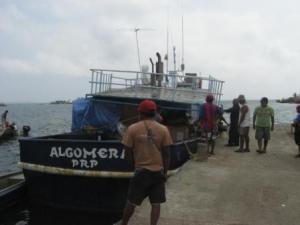
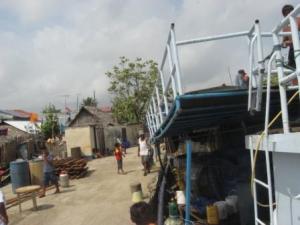
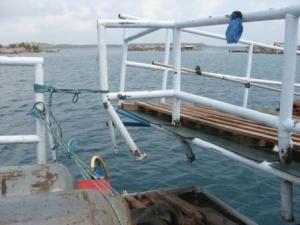
Panama, Phased Withdrawl
•July 7, 2009 • Leave a CommentOnce back in Colon we went back to the pier where we were told there would be ships. We were pleasantly surprised to find a boat that was heading to the border with Colombia in two days. The boat’s mission was to take supplies to the remote, San Blas Islands. We spoke with the captain, a short, quiet native of the Islands. After negotiating, he agreed he would take us to Puerto Valdia, on the boarder with Panama and Colombia, for $60 a piece. Apparently, from there, it was easy to find boats to more major cities in Colombia. Unfortunately, the port administration told us they needed their share of the pie, and required that we bring our passports and $100 for meaningless fees. After gifting our money and signatures to the ether, we told the captain we would be back with our stuff at his planned departure time: 10:00 at night, in two days. The logistics of our departure were done and we began to feel lighter and more hopeful. Deciding to explore more of Panama, we spontaneously screeched our way out of Colon, stumbling upon a small scenic highway, which gently wound down the Caribbean coast. After a pleasant hour ride along the coast, we found ourselves in Portobelo, a quiescent port town, far away from the woes of Panama City, Colon and the rest of the world.

In ancient times, Portobelo was one of the port towns along the route of the Spanish treasure fleets, in the 1600’s. Right at the entrance of the Port there is a large fort with remains of cannons still stealthily watching the narrow entrance of the bay. The fort apparently wasn’t fortified enough because in 1668, Captain Morgan, led a fleet against the town, and successfully plundered all the wealth from Portobelo. The land around the port is lush and hilly; and the bay has a blue, tropical hue, which stretches half a mile inland from the sullen sea. The town itself is a sleepy fishing village, tucked tightly on a gentle slope. It is truly picturesque and one of my favorite places on the trip. In the evening we came upon a Pizza place owned by an x-pat Canadian. There we met wild x-pats and life long travelers. After a hearty night of sharing stories, we drove our car below the fort on a narrow grassy slope. We set up our tent and marveled at the perfection of our campsite–privately shadowed by the ruinous fort and close enough to hear the gentle waves lapping at the shore.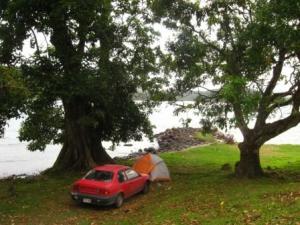
The next day we decided to drive further on the road. It quickly wound away from the bay and worked its way inland, into a beautiful, rolling Countryside. There were several villages along the way and every once in awhile we passed close enough to the ocean to catch a view of a crashing wave. The paved road gradually became a dirt road and eventually became impassable at the edge of an aloof village on the sea. We sat on the beach a while, our thoughts wandering across the tempest horizon. We grudgingly dragged ourselves away from our peaceful daze, and resolved to head back to Colon, with the purpose of selling our car to the highest bidder.

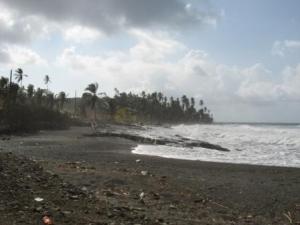
In Colon, we went toas many mechanic shops/dealerships as we could find. There were very few and even fewer could help us. Eventually we found one run by Colombians. They were incredibly warm and friendly and took to big red eagerly. They gave us an offer of $700’s and we were pleased to accept it: one because it was our best offer, but more we liked the cars new home. The car’s character had grown on us and it felt more like selling a puppy than a car. Alas, the deed was done—almost anyways. We still had a day to kill, so we kept the car until the next day, in-order to transport all of our stuff to the boat and to have mobility. The guy who was buying it told us he had a sister near Portobello and she and her husband owned a little hostel. He suggested we stay there for the night and he would pay our bill. We thought that was a great way to spend our last night in Panama. This also assured him that we would sell him our car, even if we got a better offer. We went back to the quiet beauty of Portobello and relaxed, knowing all our ducks were in a row. Early the next morning we dropped our stuff off at the port, and dropped the car off with our Colombian friend. After a lot of visiting and a small auction, for some of the cars tools, we grabbed a taxi to the boat. Once there, we helped the crew load supplies and enthusiastically waited for the boat to embark.

